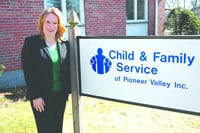A Hand Of Providence Psychiatric Elder Care Unit Provides Unique Services In The Region
“Our parents are getting older too,” Harper, coordinator of geriatric services at Providence Behavioral Health Hospital, told The Healthcare News as she sat with Carole Gossman, director of administrative services. “We want to provide the kind of care we’d want our parents to have.”
And they’re providing plenty of it in the only dedicated geriatric-psychiatric unit in Western Mass. In 2002, the unit underwent a $500,000 renovation and expansion from 12 to 16 beds, but with few such resources available for senior citizens with behavioral health issues, demand remains far too high.
And with Medicare paying for fewer treatment days than ever before, time is precious for the medical and psychological staff on the floor and their patients, many of whom suffer from dementia, severe depression, anxiety disorders, substance misuse, and other issues. It’s a frustrating part of Harper and Gossman’s lives, but a challenge they meet every day.
“There’s less time to do more,” Gossman said. “We usually have between 10 and 15 days to get a patient stabilized, make a diagnosis, put a treatment plan in place, maximize the patient’s functioning, put them on medication if needed, plan with the family to continue treatment, and set an appropriate discharge plan.”
To achieve that goal, she said, everyone must work together. That includes the most crucial element of care, the patient’s family.
Elder Focus
Providence Behavioral Health Hospital, which is part of the Sisters of Providence Health System, was transformed from an acute-care facility in 1996 to its current model, encompassing inpatient and outpatient psychiatric services, substance abuse treatment, counseling, and other programs.
But it wasn’t until 1997 that a secure unit was developed solely around elder care, ensuring privacy away from younger, often more aggressive psychiatric patients.
Both Gossman and Harper, who have worked together for 16 years, served at Charles River Hospital in Chicopee before moving to Providence. That facility’s closure in 1998 increased the demands on Providence even further. “We were turning people away left and right,” Gossman said.
With referrals arriving constantly from nursing homes, residential care services, primary care physicians, families, and even court systems, that remains a challenge.
But so is the treatment of every patient the unit does see. The hospital doesn’t offer long-term care services to seniors with dementia or other conditions, Harper said, noting that “we can’t treat dementia, but we can work with caregivers on behavioral problems.” And with a limited amount of time to keep each patient, teamwork is important.
That concept is reflected in an interdisciplinary team that meets each day — a team that includes a psychiatrist, physician’s assistant, occupational therapist, OT assistant, social worker, clinical coordinator, and direct care staff.
“It’s a holistic approach,” Gossman said. “We look at the status of the patient over the past 24 hours, review the goals of the treatment plan, see how the patient is progressing toward the goals, and make any modifications or additions to the treatment plan as needed. We do this every day with every patient.
“The conversations can be lively and spirited, and that’s a good thing,” she added. “Not everyone always agrees on the best course for patient care. They have different opinions. But they hash it out until everyone’s agreeable that we’re on course for the patient.”
The most important component in this environment of teamwork, however, must be the patient’s family or caregiver, Harper said.
“We are very family- and caregiver-focused,” she said. “The family participates at every level of care to create an environment where both they and the patient feel comfortable.”
Families are crucial, she explained, in helping patients maintain the highest-possible level of functioning and learn to accept the care they need, especially in cases such as Alzheimer’s disease, which will only worsen as the months and years go on, long after the patient has been discharged from Providence.
And the attention and education that caregivers receive isn’t only medical. A whole host of social and familial problems can arise, Harper explained, from how to remain unflustered when a patient asks the same questions every day to how to deal with a brother from out of state who pops in for the weekend and tells the caregiver she’s doing everything wrong.
“This is a hard time,” Gossman said. “They’ll never get better, and the family needs to make some hard decisions.”
The Next Step
Many of those decisions center on the next step in long-term care, and Providence has forged partnerships with a number of area agencies and resources that patients and families can hook into.
And those resources can be important as families enter difficult times. Harper told The Healthcare News that suicide rates among senior citizens are extremely high, with the rate among men over age 85 highest of any group, even adolescents. But with the proper care and support, she said, this doesn’t have to be the case.
“We want to educate people, and we also teach the family how to advocate for the patient,” Harper said. “This is a traumatic time, but these patients have tremendous strengths. One of our goals is to maintain and encourage those strengths. Just because people are here doesn’t mean they don’t have anything to offer.”
Helping to guide patients into the proper long-term treatment in a healthy environment is key to bringing out their potential late in life, but that’s easier said than done. Many long-term care centers “cherry-pick” residents to weed out those with psychological conditions, she said, but Providence will often keep patients after Medicare has stopped paying for treatment in order to help them into the right facility.
“That’s a big challenge for us — it can take days and days,” Harper said. “But we don’t discharge people into the streets.”


